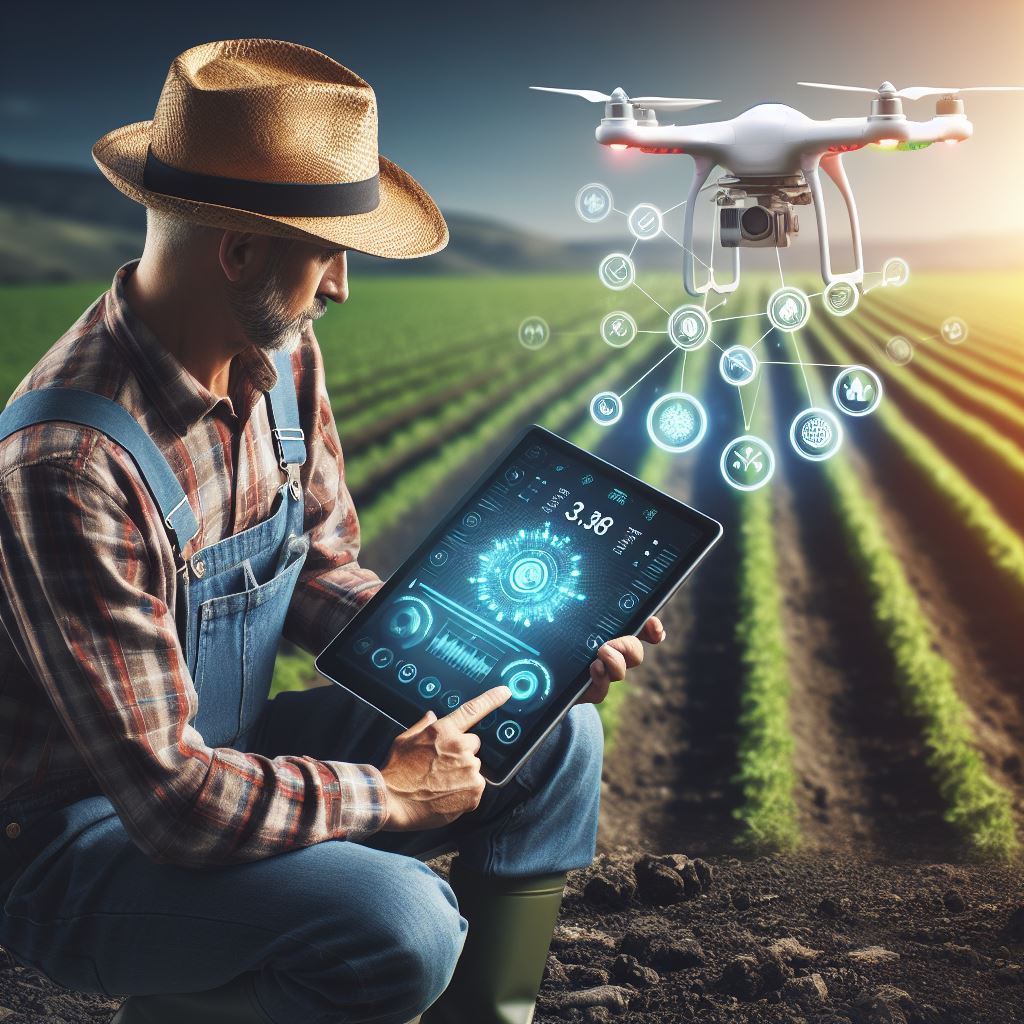Introduction
Farmer tractor tech plays a vital role in modern farming practices, revolutionizing agriculture in various ways.
This blog section focuses on the perspective of farmers, delving into how they view and utilize tractor technology to enhance productivity and efficiency on their farms.
Tractors have become an integral part of a farmer’s toolkit, enabling them to perform a multitude of tasks more effectively.
From plowing and planting to harvesting and transporting, these powerful machines have transformed the way farming is approached.
In this section, we will explore the benefits, challenges, and advancements within tractor technology from the unique lens of a farmer.
Farmers understand the significant impact that tractors have had on their daily operations and their ability to meet the demands of a growing population.
By embracing and adapting to new technologies, farmers can optimize their yields, conserve resources, and ensure the sustainability of their agricultural practices.
With the ever-evolving landscape of farming, it is crucial for farmers to stay informed about the latest tractor technologies and how they can best leverage them to achieve success on their farms.
Throughout this section, we will delve into the farmer’s perspective on tractor technology, shedding light on the integral role it plays in empowering and shaping the future of agriculture.
Evolution of Tractor Technology
Tractors have played a crucial role in agriculture for decades, revolutionizing the way farmers work on their fields.
Over the years, tractor technology has evolved significantly, enabling farmers to increase efficiency and productivity.
Let’s take a closer look at the history of tractors and their remarkable advancements.
History of Tractors and their Role in Agriculture
Tractors first appeared in the late 19th century and were initially steam-powered.
They replaced traditional methods of farming, such as horse-drawn plows, making it possible to cover larger areas in less time.
Farmers quickly recognized their potential and embraced this new technology.
Development and Advancements in Tractor Technology
Since their introduction, tractors have undergone continuous development to meet the evolving needs of farmers:
- Early gasoline-powered tractors: In the early 20th century, tractors transitioned from steam to gasoline power. Gasoline engines were more practical and cost-effective, allowing tractors to become more accessible to farmers.
- Four-wheel drive: In the 1920s, the first four-wheel-drive tractors were introduced. This enhanced traction and maneuverability, especially in challenging terrain, enabling farmers to work in previously inaccessible areas.
- Hydraulic systems: The introduction of hydraulic systems in the 1940s brought further advancements. It allowed the attachment of various implements, such as plows and harvesters, which made tractors even more versatile.
- Modern diesel engines: Diesel engines became the industry standard in the mid-20th century. They offered increased fuel efficiency and power, enabling tractors to handle larger tasks with ease.
- Automation and GPS technology: In recent decades, tractor technology has seen significant advancements in automation. GPS technology has provided farmers with precise guidance for tasks like tilling, planting, and spraying, leading to increased accuracy and reduced waste.
Milestones and Significant Moments in Tractor Technology
Throughout history, several milestones have shaped the evolution of tractor technology:
- Henry Ford’s Fordson: In 1917, Henry Ford introduced the Fordson, the first mass-produced tractor. Its affordable price brought tractors within reach for many small-scale farmers.
- The Farmall: In 1924, International Harvester launched the Farmall, the first successful row-crop tractor. Its innovative design allowed farmers to work between crop rows, increasing cultivation efficiency.
- The John Deere 4020: Released in 1963, the John Deere 4020 became one of the most successful tractors of its time. It incorporated advanced features such as power shift transmission and became a benchmark in the industry.
- Precision farming: The introduction of precision farming in the 1990s marked a new era in tractor technology. With the integration of sensors, data analytics, and yield mapping, farmers could make informed decisions and optimize their operations.
As we look back at the evolution of tractor technology, it becomes clear that tractors have come a long way.
From simple steam-powered machines to highly advanced and automated vehicles, they have transformed agriculture and enabled farmers to meet the demands of an ever-changing world.
Today, tractors continue to evolve, with ongoing research and development focused on increased fuel efficiency, reduced emissions, and further automation.
The future of tractor technology promises even greater advancements, ensuring the sustainability and productivity of modern agriculture.
Read: Rooftop Farm Magic: An NYC Urban Farmer’s Tale
Benefits of Modern Tractor Technology
Farmers have always relied on tractors to carry out various tasks on their farms.
With advancements in technology, modern tractors have revolutionized farming practices, offering numerous benefits to farmers.
Increased Efficiency and Productivity
- Modern tractors are equipped with advanced features that automate and streamline farming operations.
- Efficient engines, powerful hydraulics, and precise controls enable farmers to complete tasks faster and with greater accuracy.
- Features such as GPS guidance systems help farmers optimize field operations, reducing wastage of time and resources.
- With increased efficiency, farmers can accomplish more in less time, leading to improved productivity.
Improved Fuel Economy
- Modern tractors incorporate fuel-efficient engines and advanced technologies to optimize fuel consumption.
- Efficient engines provide more power output with lesser fuel consumption, resulting in cost savings for farmers.
- Advanced transmission systems and variable speed controls allow farmers to adapt the tractor’s power output according to the task at hand, further enhancing fuel efficiency.
- Reduced fuel consumption not only saves money but also reduces dependence on fossil fuels, promoting sustainability.
Reduced Emissions
- Modern tractors are designed to comply with strict emission standards, reducing the environmental impact.
- Efficient engines produce fewer harmful emissions, contributing to cleaner air and a healthier environment.
- Intelligent exhaust systems and catalytic converters help minimize the release of pollutants into the atmosphere.
- Farmers embracing modern tractor technology play a significant role in mitigating climate change and protecting our planet.
Sustainable Farming Practices
- Modern tractors support sustainable farming practices by promoting precision agriculture.
- GPS guidance systems and advanced sensors enable farmers to precisely apply fertilizers and pesticides, minimizing waste and soil contamination.
- Automated control systems monitor soil conditions, moisture levels, and crop health, allowing farmers to optimize resource usage.
- By adopting sustainable farming practices, farmers can protect natural resources, reduce environmental impacts, and ensure long-term agricultural viability.
In fact, modern tractor technology has provided farmers with numerous benefits.
Increased efficiency and productivity, improved fuel economy, reduced emissions, and the promotion of sustainable farming practices are just a few advantages that these technological advancements offer.
As the agriculture industry continues to evolve, embracing modern tractor technology becomes essential for farmers looking to thrive in today’s competitive environment.
Read: High-Rise Gardens: Urban Farming in Chicago
Key Features and Innovations
In the modern era, tractors have come a long way, incorporating several key features and innovations.
These advancements have revolutionized the farming industry, making tasks easier and more efficient for farmers.
Let’s take a closer look at some of the notable features and innovations in modern tractors:
- Increased Power and Performance: Modern tractors are equipped with powerful engines that provide higher horsepower and torque, enabling them to efficiently handle heavy-duty tasks.
- Efficient Fuel Consumption: Tractors now come with advanced fuel injection systems and efficient engine designs, resulting in improved fuel economy and reduced operating costs.
- Enhanced Comfort and Ergonomics: Tractor manufacturers have focused on providing comfortable operator cabins, with ergonomic controls and adjustable seating, reducing fatigue during long working hours.
- Advanced Transmission Systems: Shift-on-the-go transmissions and continuously variable transmissions (CVT) allow for smooth and seamless gear changes, enhancing operator convenience and productivity.
- Versatile Attachments and Implements: Modern tractors are designed to accommodate a wide range of attachments and implements, allowing farmers to perform various tasks such as plowing, tilling, harvesting, and spraying.
Integration of GPS and Precision Agriculture Technologies
One of the most significant advancements in tractor technology is the integration of Global Positioning System (GPS) and precision agriculture technologies.
These innovations have transformed the way farmers manage their fields and apply inputs. Here are some key aspects of this integration:
- Precision Guidance: Tractors incorporate GPS receivers and navigation systems, enabling precision guidance for activities like planting, spraying, and harvesting. This ensures accurate and efficient operations.
- Variable Rate Control: With the help of GPS, tractors can vary the application rate of fertilizers, pesticides, and other inputs based on specific field conditions, optimizing resource usage and minimizing environmental impact.
- Data Collection and Analysis: Tractors equipped with precision agriculture technologies gather data on soil conditions, yield variability, and crop health. Farmers can use this information to make data-driven decisions for maximizing productivity.
- Auto-Steer and Auto-Swath: Tractors now have auto-steering capabilities, allowing them to navigate straight and precise paths. Auto-swath functionality ensures accurate on/off control of implements, minimizing overlap and wastage.
Importance of Automation, Connectivity, and Data Management Systems
In the era of smart farming, automation, connectivity, and data management systems play crucial roles in optimizing tractor operations and overall farm efficiency:
- Automation: Tractors with automation features can perform tasks with minimal human intervention, increasing productivity, reducing labor costs, and freeing up farmers’ time for other critical activities.
- Connectivity: Through wireless communication technologies, modern tractors can connect to farm management systems, remote monitoring platforms, and even other machinery. This connectivity enables real-time data sharing and remote control.
- Data Management Systems: Tractors now come equipped with advanced data management systems that store and analyze field data. These systems offer valuable insights into crop performance, enabling better decision-making for future operations.
- Remote Diagnostics and Support: Connectivity allows manufacturers or technicians to remotely access tractor systems, diagnosing issues, and providing support, resulting in reduced downtime and faster problem resolution.
These key features, innovations, and the integration of GPS and precision agriculture technologies, along with automation, connectivity, and data management systems, have truly transformed the farming landscape.
Farmers can now accomplish more in less time, increase yields, conserve resources, and make sustainable decisions, contributing to the overall growth and development of the agricultural sector.
Transform Your Agribusiness
Unlock your farm's potential with expert advice tailored to your needs. Get actionable steps that drive real results.
Get StartedRead: LA’s Urban Farm Revolution: A Local’s Story

Challenges and Limitations
Potential Challenges and Limitations for Farmers with Tractor Technology
- Steep learning curve in adapting to new technologies can pose challenges for farmers.
- Limited understanding of complex tractor systems can hinder effective utilization of advanced features.
- Compatibility issues between different tractor systems may require additional investments.
- Unreliable network connectivity in rural areas can hinder the functioning of technology-dependent tractors.
- Expensive repair costs for high-tech tractor components can strain farmers’ budgets.
- Lack of access to technical support and skilled labor in remote farming communities can be a limitation.
- Upgrading or replacing outdated tractors with advanced technology is a costly endeavor for farmers.
- The initial cost of purchasing advanced tractor systems is often higher compared to traditional models.
- Complexity of tractor technology increases the risk of technical malfunctions and breakdowns.
- Regular software updates and compatibility requirements demand technical expertise and time commitment from farmers.
Learning Curve and Training for Farmers to Adapt to New Technologies
- Farmers need extensive training to understand and utilize the features of modern tractor technology.
- Training programs focusing on digital literacy and technology adoption can help in reducing the learning curve.
- Hands-on workshops and demonstrations are essential to familiarize farmers with advanced tractor systems.
- Collaboration between tractor manufacturers and agricultural extension services can provide effective training opportunities.
- Encouraging peer-to-peer learning and farmer networks can facilitate knowledge sharing and support during the adaptation process.
Cost of Purchasing and Maintaining Advanced Tractor Systems
- High upfront costs of purchasing advanced tractor systems can deter farmers from adopting the technology.
- Additional expenses for training, software updates, and maintenance contribute to the overall cost.
- Financial incentives or subsidies provided by governments can alleviate the burden of purchasing expensive machinery.
- Collaborative ownership or rental programs can offer cost-effective solutions to access advanced tractor systems.
- Regular maintenance and repairs by trained technicians ensure smooth operation and longevity of the technology.
- Budgeting for ongoing operational costs and investing in preventative maintenance help farmers manage expenses.
- Proper documentation and record-keeping enable farmers to plan and budget for tractor technology maintenance.
Despite the challenges and limitations, tractor technology has the potential to revolutionize farming practices, increase efficiency, and improve yields.
With proper training, support, and financial planning, farmers can successfully navigate the transition to new technologies and reap the benefits they offer.
By addressing the potential obstacles, facilitating training programs, and implementing strategies to manage costs, the agricultural sector can embrace tractor technology and continue to advance the industry for a sustainable future.
Read: Farming with Kids: A Family’s Journey
Delve into the Subject: From City Life to Farm Living: Women’s Tales
Farmer’s Perspective on Tractor Technology
Farmers have long relied on tractors as an essential tool for their daily operations.
Over the years, tractor technology has advanced significantly, revolutionizing the way farmers work and increasing their efficiency and productivity.
In this blog section, we delve into the opinions and experiences of farmers regarding tractor technology, sharing personal anecdotes and discussing the impact it has had on farm operations and the farming industry as a whole.
Increased Efficiency and Productivity
Modern tractors equipped with advanced technology have transformed the farming landscape, making tasks faster and easier for farmers.
With improved horsepower and precision control, farmers can now efficiently plow large fields in a fraction of the time it used to take.
The ability to attach various implements like planters, sprayers, and harvesters further enhances productivity.
Jim, a seasoned farmer from Iowa, recounts his experience with a new tractor: “Our old tractor was slow and lacked precision.
But when we upgraded to a technologically advanced one, it was like a game-changer.
We could finish tasks in half the time, allowing us to focus on other critical aspects of our farming.”
Enhanced Precision and Accuracy
Tractor technology has also revolutionized precision farming, enabling farmers to achieve higher accuracy in various operations.
GPS technology integrated into tractors allows for precise positioning, resulting in optimized seed planting, targeted pesticide application, and efficient harvesting.
This not only saves time and resources but also minimizes environmental impact.
Lisa, a farmer from Kansas, shares her experience with a tractor equipped with precision technology: “Before, it was challenging to plant seeds evenly across the field, leading to uneven crop growth.
But with the advanced guidance system in my tractor, I can now achieve perfect row spacing, resulting in better yields.”
Improved Operator Comfort and Safety
Modern tractors prioritize the well-being of the farmers operating them.
With ergonomic seating, climate control, and reduced vibrations, these tractors offer enhanced comfort during long hours of work.
Furthermore, safety features like roll-over protection systems (ROPS) and seat belts ensure that farmers are protected in case of accidents, reducing the risk of serious injuries.
John, a dairy farmer, highlights the importance of safety features: “Once, I had a close call when my old tractor overturned.
But ever since I switched to a tractor with ROPS, I feel so much safer. It gives me peace of mind while working on uneven terrains.”
Economic Implications
Tractor technology not only benefits individual farmers but also has significant economic implications for the farming industry as a whole.
By streamlining operations, reducing labor requirements, and improving yields, advanced tractors contribute to higher profitability and sustainability.
This allows farmers to invest in better equipment and technologies, creating a positive ripple effect on the entire agricultural sector.
Emily, a small-scale farmer specializing in organic produce, expresses her excitement: “With the increased efficiency of my tractor, I’ve been able to expand my operations and meet the growing demand for organic products.
It has opened up new opportunities for me and my fellow farmers.”
Tractor technology, from enhanced efficiency and precision to improved safety and economic implications, has revolutionized farming from a farmer’s perspective.
The advancements in modern tractors have undoubtedly made a positive impact on farm operations, allowing farmers to accomplish more in less time while ensuring optimal yield and sustainability.
As technology continues to evolve, farmers eagerly embrace the latest innovations, eagerly anticipating the next breakthrough that will further optimize their work.
Conclusion
Tractor technology has proven to be immensely important and impactful from a farmer’s perspective.
The introduction of advanced machinery has revolutionized the way farming is done, making it more efficient and profitable.
Embracing and adapting to technological advancements in agriculture is crucial for farmers to stay competitive in today’s ever-changing market.
Tractor technology has enabled farmers to increase productivity, reduce labor costs, and minimize environmental impact.
As we look towards the future, the prospects of tractor technology in farming are incredibly promising.
With ongoing research and development, we can expect even more advanced and sophisticated machinery that will further enhance farming practices.
It is essential for farmers and the entire agricultural community to embrace these advancements wholeheartedly.
Technology is not something to be feared or resisted but rather embraced as a tool that will help us overcome challenges and achieve sustainable and efficient farming practices.
By harnessing the power of tractor technology, farmers can create a brighter future for themselves and the world.
It is an opportunity to improve their livelihoods and ensure food security for the growing global population.
So, let us remain optimistic and enthusiastic about the future of tractor technology.
With continued innovation, collaboration, and a willingness to adapt, we can unlock endless possibilities and achieve remarkable progress in the world of farming.




